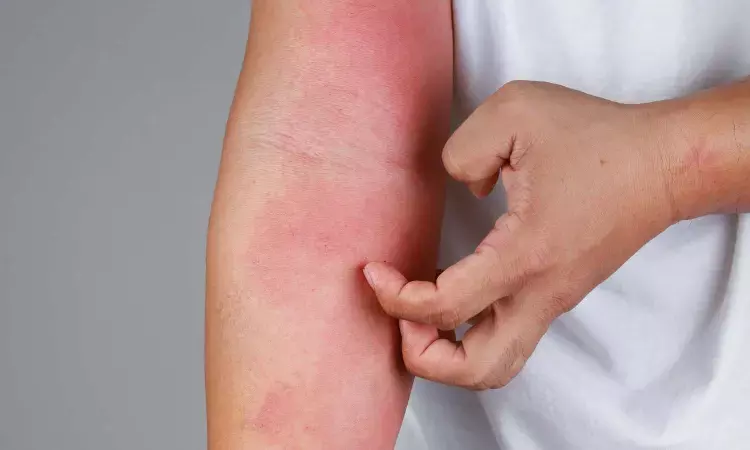- Home
- Medical news & Guidelines
- Anesthesiology
- Cardiology and CTVS
- Critical Care
- Dentistry
- Dermatology
- Diabetes and Endocrinology
- ENT
- Gastroenterology
- Medicine
- Nephrology
- Neurology
- Obstretics-Gynaecology
- Oncology
- Ophthalmology
- Orthopaedics
- Pediatrics-Neonatology
- Psychiatry
- Pulmonology
- Radiology
- Surgery
- Urology
- Laboratory Medicine
- Diet
- Nursing
- Paramedical
- Physiotherapy
- Health news
- Fact Check
- Bone Health Fact Check
- Brain Health Fact Check
- Cancer Related Fact Check
- Child Care Fact Check
- Dental and oral health fact check
- Diabetes and metabolic health fact check
- Diet and Nutrition Fact Check
- Eye and ENT Care Fact Check
- Fitness fact check
- Gut health fact check
- Heart health fact check
- Kidney health fact check
- Medical education fact check
- Men's health fact check
- Respiratory fact check
- Skin and hair care fact check
- Vaccine and Immunization fact check
- Women's health fact check
- AYUSH
- State News
- Andaman and Nicobar Islands
- Andhra Pradesh
- Arunachal Pradesh
- Assam
- Bihar
- Chandigarh
- Chattisgarh
- Dadra and Nagar Haveli
- Daman and Diu
- Delhi
- Goa
- Gujarat
- Haryana
- Himachal Pradesh
- Jammu & Kashmir
- Jharkhand
- Karnataka
- Kerala
- Ladakh
- Lakshadweep
- Madhya Pradesh
- Maharashtra
- Manipur
- Meghalaya
- Mizoram
- Nagaland
- Odisha
- Puducherry
- Punjab
- Rajasthan
- Sikkim
- Tamil Nadu
- Telangana
- Tripura
- Uttar Pradesh
- Uttrakhand
- West Bengal
- Medical Education
- Industry
Baseline Biomarkers,sex and duration of disease May Predict Dupilumab Efficacy in Atopic Dermatitis: Study

Researchers have been able to identify whether patients with atopic dermatitis who receive dupilumab treatment will respond effectively to such treatment, based on biomarkers and clinical background at baseline. Factors like the duration of severe atopic dermatitis (AD), comorbid food allergies, male sex, and baseline serum lactate dehydrogenase levels proved to be negatively associated with clinical improvement as per a multi-center prospective study. The study was recently published in the Journal of Allergy and Clinical Immunology by Kido-Nakahara and colleagues.
Atopic dermatitis is a complex chronic inflammatory skin disorder characterized by dysfunction of the skin barrier, great itching sensation, and recurrence of inflammation. The disease is quite heterogeneous, depending on multiple genetic and environmental factors. Great progress has been made in the treatment of AD with the advent of new biologic therapies, including dupilumab, which specifically inhibits inflammation through blockade of the IL-4Rα receptor. The challenge remains identifying which patients will respond best to this treatment. This study, led by Dr. Makiko Kido-Nakahara, attempted to elucidate predictors of response to dupilumab at baseline with regard to biomarkers and patient characteristics.
This was a phase III, multicenter, randomized study where 131 patients with moderate-to-severe AD were enrolled between October 2019 and March 2022 from 19 medical facilities in Japan. All participants were recruited on the basis of at least one of the following:
EASI score of at least 16.
IGA score of at least 3.
More than 10% of their body surface area was affected by eczema.
They had chronic AD for at least 3 years before the study.
The patient background factors examined included age, sex, BMI, duration of severe AD, comorbid allergic diseases, and family history of allergic conditions. Baseline serum biomarkers, including LDH, were also determined. The participants were assessed based on clinical assessments, such as EASI, POEM, and Pruritus-NRS.
There were 131 patients in the first cohort and for the effectiveness analysis, this was reduced to 110. Mean duration of AD was 16.5 years.
The logistic regression models did not find any significant association of baseline patient factors with an EASI score of 75 or 90.
There was an inverse relationship found between no food allergy and achieving an absolute EASI score of ≤7; long term severe AD duration also tended with not reach a POEM score of ≤7.
Male subjects were less likely to achieve a POEM score of ≤2, and allergic conjunctivitis subjects were less likely to achieve a Pruritus-NRS score of ≤1.
There was an inverse correlation of serum baseline LDH levels with the clinical outcomes, and an LDH level ≤328 U/L was determined as a cutoff value to predict the successful outcome of dupilumab therapy. Approximately 82% of the enrolled participants demonstrated an EASI of ≤7 when their baseline LDH level was below that threshold
The baseline biomarkers were not correlated with achieving an EASI of 75 or 90 or a obtained score in POEM ≤2.
This study represents a first effort to put forward serum LDH levels as a cut-off value that would predict the effectiveness of dupilumab in AD. Patients with an LDH level of ≤ 328 U/L had good clinical outcomes in the form of an EASI score of ≤ 7. Thus, baseline biomarkers supplemented by clinical background factors may constitute a very useful guide in the treatment of patients with moderate-to-severe AD using dupilumab.
Reference:
Kido-Nakahara M, Onozuka D, Izuhara K, et al. Biomarkers and patient-related factors associated with clinical outcomes in dupilumab-treated atopic dermatitis. J Allergy Clin Immunol Glob. 2024;3(4):100317. Published 2024 Jul 31. doi:10.1016/j.jacig.2024.100317
Dr Riya Dave has completed dentistry from Gujarat University in 2022. She is a dentist and accomplished medical and scientific writer known for her commitment to bridging the gap between clinical expertise and accessible healthcare information. She has been actively involved in writing blogs related to health and wellness.
Dr Kamal Kant Kohli-MBBS, DTCD- a chest specialist with more than 30 years of practice and a flair for writing clinical articles, Dr Kamal Kant Kohli joined Medical Dialogues as a Chief Editor of Medical News. Besides writing articles, as an editor, he proofreads and verifies all the medical content published on Medical Dialogues including those coming from journals, studies,medical conferences,guidelines etc. Email: drkohli@medicaldialogues.in. Contact no. 011-43720751


